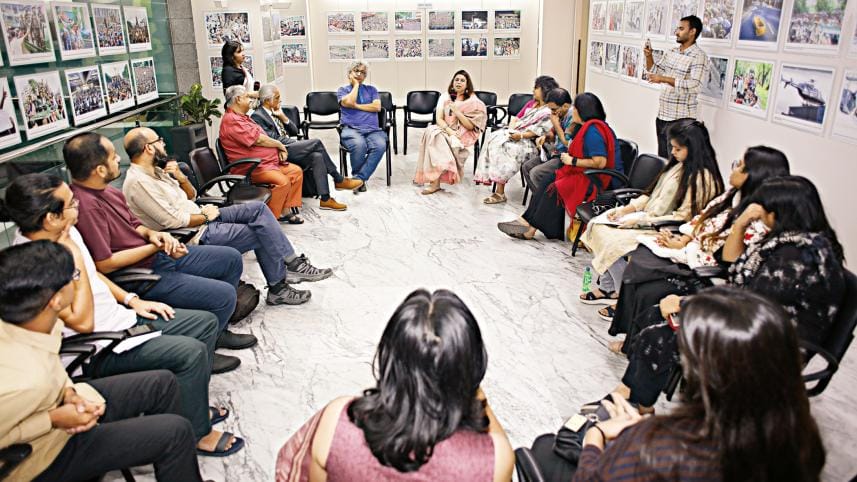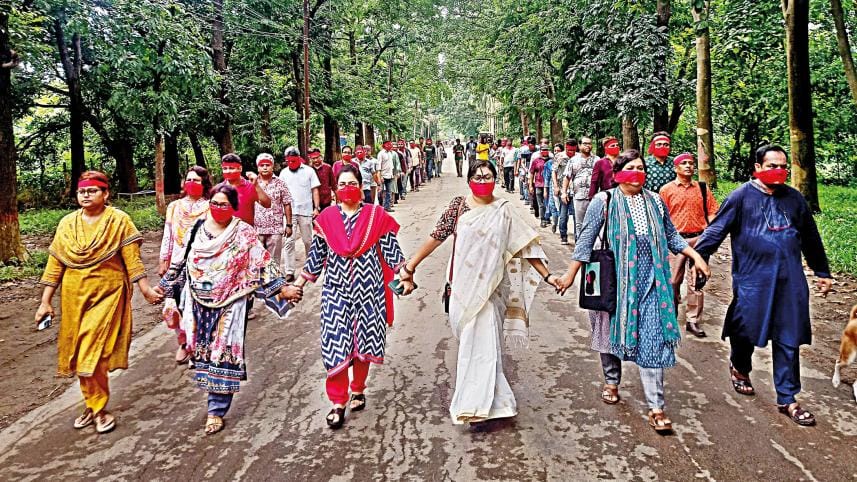Lessons in Liberation: Universities and the Fight for Justice

The July Uprising has put forth an interesting revelation: the role of students, backed by teachers, and educational institutions as a whole, in shaping a country's political future. When Nietzsche highlighted the three objectives of educators in a society, stating, 'people must learn to see; they must learn to think, and they must learn to speak and to write', he essentially defined the role of teachers in enabling individuals to shape a society driven by nobility, virtue, moral and intellectual excellence. This essence was captured in an engaging session titled 'Pedagogy of Protest: A Discussion with University Teachers on the Frontlines,' organised by The Daily Star as part of the weeklong programme '36 Days of July: Saluting the Bravehearts.' The open discussion was held between students and teachers who played an active role during the July movement.
The historic uprising in July represented the voice of youth rising against various forms of hegemony. It underscored the potential of politically aware students and the need for supportive educators to cultivate spaces for critical thought and discourse. The discussion explored critical questions: How can teachers engage politically aware students in classrooms? How courageous are educators in fostering the political awareness expected of young individuals?

Bridging Gaps in Classroom Discourse
Prof. Mirza Taslima Sultana of Jahangirnagar University highlighted the structural and systemic barriers that hinder open discussions in classrooms. 'Students and teachers face challenges due to systemic gaps and political influences,' she noted. These issues hamper the creation of an environment conducive to intellectual debate and political awareness. In private universities, the restrictions are even more pronounced. Musharrat Sharmee Hossain, a faculty member at North South University, observed that department-wise limitations and a curriculum designed to serve a capitalist, politically neutral model often restrict meaningful political discourse.
'Are we attempting to depoliticise private university students?' Musharrat questioned, reflecting on the heightened academic pressure since the movement ended. While private universities pride themselves on being politically neutral, they inadvertently stifle political awareness. However, she also highlighted the scope for introducing more diversified general education courses, including those focused on linguistics and politics, to foster critical discussions. 'There is a lot of potential to create spaces where politics can be discussed constructively,' she added.
Encouraging Multiplicity of Voices
The discussion frequently returned to the need for plurality and openness in classrooms. Shahnawaz Khan Chandan, a faculty member at Jagannath University, stressed the importance of presenting multiple interpretations of theories to students and allowing them to decide which resonates most with them. He warned against imposing singular perspectives, noting that previous governments' attempts to propagate specific versions of history were met with student resistance.
'As educators, we must not promote or propagate one-sided narratives. Instead, we should create spaces where all voices can be heard,' Shahnawaz emphasized. This plurality, he argued, not only fosters critical thinking but also prevents the alienation of students from different socio-economic or ideological backgrounds.
Political Clubs as Platforms for Dialogue
The need for alternative platforms to engage students politically without direct involvement in active politics was another key takeaway. One participant suggested forming political science clubs where students can discuss and debate political ideas in a constructive environment. 'Student politics does not have to mean street protests. There are other ways to engage politically, such as organised discussions and forums,' they remarked. Such platforms can instil a sense of participation in politics while fostering mutual respect and tolerance for diverse opinions.
Making Universities Where Free Thoughts Thrive
The intersection of education and state politics was a recurring theme. Dhaka University Prof. Tanzimuddin Khan, a member of the University Grants Commission (UGC), argued that the education system is deeply intertwined with the state system. 'If we don't change the state system, there is no hope for the education system,' he said, highlighting issues of structural discrimination along lines of gender, religion, and medium of instruction.
Prof. Kamrul Hassan of Dhaka University echoed these concerns, comparing teachers and journalists to the 'white blood cells' of society. 'We've failed to build universities as true institutions of higher learning. Students are still afraid to ask questions, keeping universities at a school-like level,' he remarked. He called for open discussions on research, science, and politics, noting that such exchanges between students and teachers in foreign universities foster connections that are currently missing in Bangladesh.
Only by addressing these issues can we hope to forge an education system and political culture where we will be able to ask and receive questions fearlessly, express what we think and not lose composure when others say what they think, and cherish the pursuit of truth, while remaining humble about whether we know it.
Cultivating Political Awareness from a Young Age
Several speakers emphasized the need to introduce political education at the primary and secondary levels. 'Politics is embedded in society, and society is embedded in politics,' Prof. Tamziuddin Khan observed. Teaching students that politics is more than street protests—that it is about constructive discussion and critical engagement—is crucial. Family guidance also plays a significant role in fostering political awareness, encouraging young people to think beyond their immediate socio-economic bubbles.
Autonomy and Structural Reforms
Autonomy for universities emerged as a critical point. Prof. Mirza Taslima Sultana and Musharrat Sharmee Hossain both called for universities to have the freedom to set their academic and administrative priorities. 'Without autonomy, the UGC's excessive control over everything, from class schedules to teaching methods, hampers the growth of institutions,' Musharrat noted.
However, autonomy alone is not enough. Prof. Kamrul Hassan pointed out that discrimination among students and teachers persists, undermining the potential for universities to act as transformative spaces. 'We must build institutions that empower students to become free thinkers, not ones that impose restrictions on their voices,' he said.
Sustaining Political Discourse
One of the most significant challenges discussed was maintaining the political awakening among private university students sparked by the July Uprising. Participants noted that after the movement, academic pressures, particularly in private universities, have dulled the momentum. The question remains: How can we sustain this discourse across all educational institutions, public and private?
Prof. Kamrul Hassan suggested introducing student unions at all levels, including schools and colleges, to give students a platform to voice their demands and engage in constructive dialogue. 'This practice must start early and be sustained throughout their academic journey,' he argued.
A Vision for the Future
Concluding the session, Nazia Manzoor, editor of Daily Star Books and Literature, emphasized the importance of questioning structural flaws in society from the root level. 'If we can't raise questions now, the future of this country will be bleak,' she warned. Participants agreed that promoting mutual understanding and respect through family guidance and education, beginning at the primary level, is essential for nurturing a politically aware and tolerant generation.
The July Uprising has shown the importance of politically aware youths, who can challenge hegemony and advocate for justice. The discussion emphasizes the urgent need for structural reforms, constructive classroom discourse, and sustained platforms for dialogue to nurture such a generation. Only by addressing these issues can we hope to forge an education system and political culture where we will be able to ask and receive questions fearlessly, express what we think and not lose composure when others say what they think, and cherish the pursuit of truth, while remaining humble about whether we know it.
Recommendations
- Political education must begin at the primary level to help youth engage constructively with societal issues.
- Structural reforms are needed to make universities inclusive spaces for free thought and open dialogue between teachers and students.
- Educational curricula should include diversified general education courses to foster critical thinking and sustained political discourse.
- Universities require autonomy from excessive state control to prioritise academic and administrative growth.
- Alternative platforms, such as political science clubs and student unions, are essential for sustaining political discourse in academic institutions.
Miftahul Jannat is a journalist at The Daily Star




 For all latest news, follow The Daily Star's Google News channel.
For all latest news, follow The Daily Star's Google News channel.
Comments